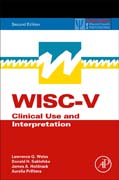
WISC-V: Clinical Use and Interpretation
Weiss, Lawrence G.
Saklofske, Donald H.
Holdnack, James A.
Prifitera, Aurelio
WISC-V: Clinical Use and Interpretation, Second Edition provides practical information for clinicians on the selection of subtest measures, along with their proper administration and interpretation. Full Scale IQ is identified as important for predicting relevant behaviors and primary index scores for characterizing the child's strengths and weaknesses. Classroom indicators of low scores on each of these abilities are identified, with suggested interventions, accommodations and instructional strategies for low scorers. Coverage includes ethnic differences for the Full Scale IQ and each primary index score, along with evidence of the profound influence of parental attitudes and expectations. Several other societal and contextual factors relevant to understanding racial/ethnic differences are presented. Two chapters review use of the WISC-V for identifying learning disabilities, testing of individuals with dyslexia, and best-practice recommendations to ensure accurate diagnosis and intervention. Concluding chapters describe advances in the Q-interactive system platform allowing administration of the WISC-V on iPads and other tablets, and how clinicians can tailor assessment using select WISC-V subtests and features. Authored by the creators of the WISC-VDescribes the new subtests, revised test structure and test extensionsAdvises clinicians on test selectionProvides test result interpretationDiscusses clinical applications of test use INDICE: 1. WISC-V: Advances in the Assessment of Intelligence 2. Practical Considerations in WISC-V Interpretation and Intervention 3. Advanced Interpretation of Executive Processes with WISC-V Integrated 4. Theoretical and Clinical Foundations of the WISC-V Index Scores 5. WISC-V Use in Societal Context 6. Testing Hispanics with WISC-V and WISC-V Spanish 7. Cross Cultural Issues in Children's Intelligence: An International Perspective 8. The Flynn Effect and its Clinical Implications 9. WISC-V and the Evolving Role of Intelligence Testing in the Assessment of Learning Disabilities 10. Translating Scientific Progress in Dyslexia into Twenty-first Century Diagnosis and Interventions 11. Issues Related to WISC-V Assessment of Cognitive Functioning in Special and Clinical Groups 12. Digital Assessment with Q-interactive 13. WISC-V and the Personalized Assessment Approach
- ISBN: 978-0-12-815744-2
- Editorial: Academic Press
- Encuadernacion: Cartoné
- Páginas: 500
- Fecha Publicación: 01/02/2019
- Nº Volúmenes: 1
- Idioma: Inglés
